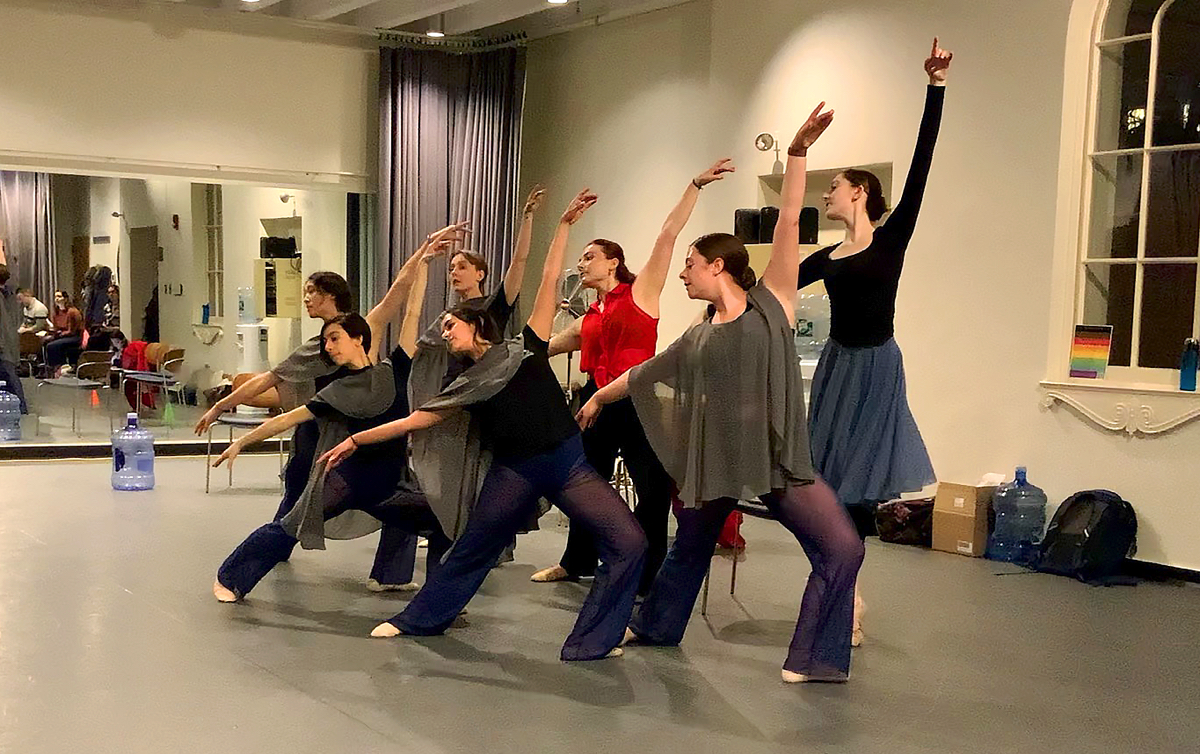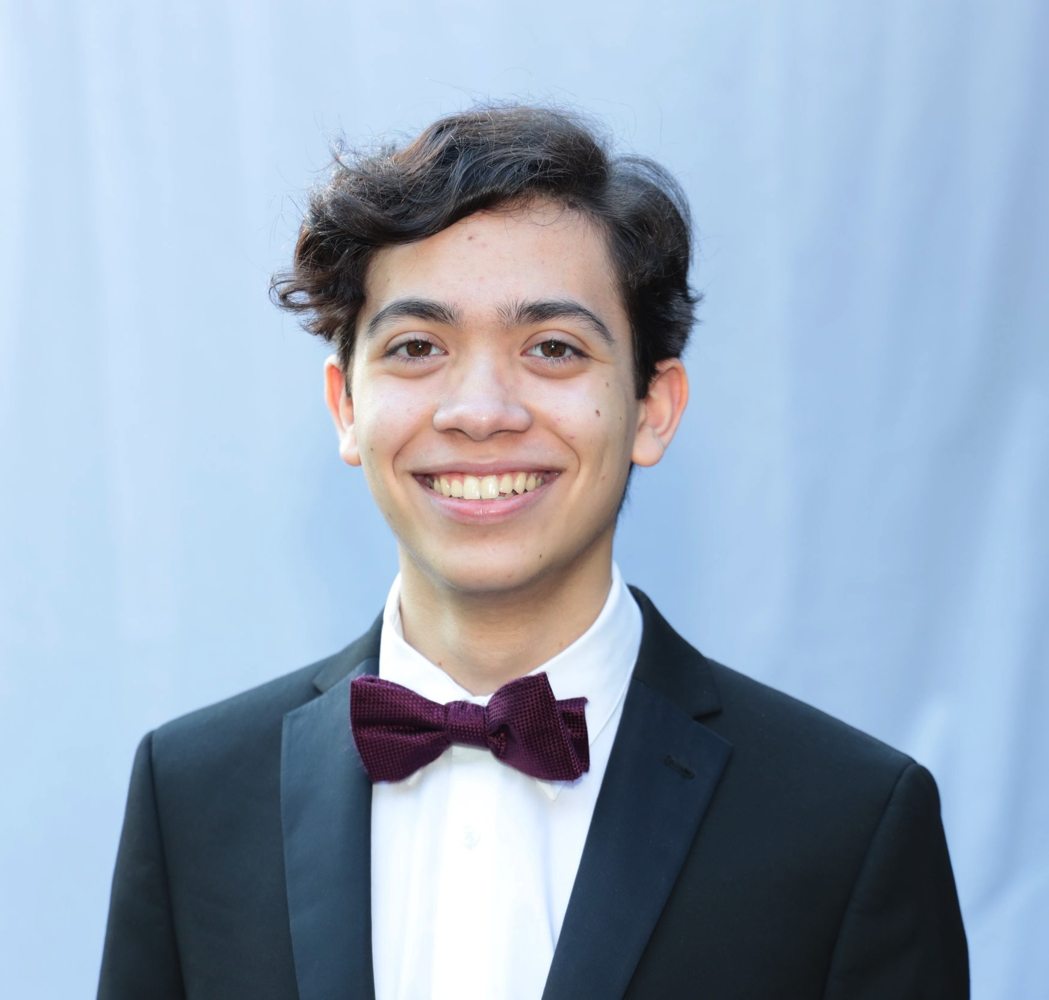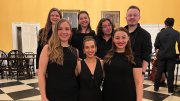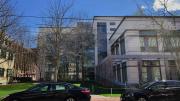On the last day of winter break, as other undergraduates emerged from taxis and the T bleary-eyed and hauling suitcases, the cast of the Lowell House Opera gathered in the Lowell Junior Common Room to put together the pieces of The Unknowable for the first time.
Benjamin Rossen ’23—composer and librettist of the operatic ballet, which will be performed by a student and professional cast at Sanders Theatre on February 10 and 11—played the work’s opening notes on the piano: a deliberate, stately melody accompanied by an undulating, dreamy left-hand accompaniment. Lavinia Kosher—a senior at Boston University and a member of the Harvard Ballet Company—embodied the music, performing traditional ballet leaps and turns punctuated by sudden pauses, angular movements, falls to the floor. At times, she reached her arms out, as if longing for something the audience couldn’t see.
The singers and dancers had rehearsed separately before that evening’s sitzprobe, or initial rehearsal where vocalists and other performers coordinate their performances. But this was the first time that Rossen, a College alumnus completing his master’s in piano performance at the New England Conservatory, watched the performances converge. “Seeing all the moving parts come together—that, to me, is why I do this in the first place,” he says. “This is what fascinates me as a director: to oversee every moving part and create a gestalt, or something bigger than all of us. I was so deeply moved and humbled when I realized this is a show, this is really a show.”

The Unknowable centers around Edna, a talented, ambitious young musician, as she attends a dinner party hosted by her parents. Guests press her to spend an upcoming vacation in various ways: her mother encourages her to receive a music award and network with the other winners; her sister wants her to travel with her. Throughout, partygoers listen to opera music by the nineteenth-century composers Hector Berlioz and Gustav Mahler on a “speaker”—the music sung by professional vocalists Aurora Martin and Emerald Barbour, respectively.
Overwhelmed by the pressure, Edna dissociates from the party in a Nutcracker-esque twist. In a dream world, she dances to music from Berlioz’s Les nuits d’été and Mahler’s Lieder eines fahrenden Gesellen. Four Gesellen—journeymen from Mahler’s opera—appear and dance with Edna, their movements exalting and yearning as in the introduction.
The choreography was crafted by Emily Parker, a former ballerina with the Oregon Ballet Theater currently completing post-baccalaureate studies at the Extension School to prepare for medical school. “There’s a specific language in classical ballet to tell stories. You’ll be pointing to your hand with your other hand, for example, and it means you’re going to get married,” she says. But with The Unknowable, she had the freedom to focus on a more abstract expression of emotion as conveyed by the music and experienced by the characters. “I spent a lot of time thinking about each of these characters, and their place in the story and what they contribute to the plot,” she says.
The Lowell House Opera (LHO) is the oldest professional opera company currently performing in New England. The group’s first performance, in 1938, was Henry Purcell’s Dido and Aeneas, and since then, it has traditionally performed classical operas in Lowell House’s yellow-walled dining hall, featuring casts of professionals working together with students. Stephen Coit ’71, M.B.A. ’77—a painter, venture capitalist, and former Lowell House resident on the LHO board—remembers performances from his years as a College student, attended by the likes of Leonard Bernstein ’39, D.Mus. ’67. “I remember wandering among the old tunnels of Lowell House, where tiny rooms under the ground were taken over as changing rooms and green rooms and for scenery,” he says. “[The opera] was kind of like this animal that sets up its nest in Lowell House in a seasonal visit.”
Two years ago, however, the LHO reoriented toward producing student-written operas, as opposed to classical works, with the hopes of showcasing student talent and engaging contemporary audiences. The 2022 production was Nighttown, an original opera written by Benjamin Wenzelberg ’21 based on James Joyce’s Ulysses. Over the summer, Lowell House Faculty Dean David Laibson, Goldman professor of economics, asked Rossen, who had participated in previous productions of the opera, to be this year’s executive director. “I was elated,” Rossen says, and he wrote The Unknowable specifically for the occasion.
The cast includes students from Harvard and other universities in Boston, along with working professionals in dance and music. “[The Lowell House Opera] is one of the only opera companies in the country that provides opportunities for undergraduates who are interested in music to work with professionals in the field,” says Kenneth Kaufman ’69, an attorney, composer, and former Lowell House resident on the opera board. Among musical productions, “you often see professional leadership and students who intern or shadow or perform as understudies. Or you see student-led productions, but they are fully student-run,” Rossen adds. “But this really is, I like to think, 50-50 professional and student leadership”—not just in the artistic production, but also in the business operations.
During her experience in the dream world, Edna sings along with a friend, “Let us build us a city! Let us build us a tower! With that unalloyed confidence, we close the world.” Soon after this burst of confidence, however, Edna emerges from the dream, no closer to clarity about how to spend her vacation than when she entered. The line is an allusion to the story of the Tower of Babel in the Book of Genesis, Rossen says, where proud, presumptuous humans attempt to reach divinity and are subsequently dispersed across the earth and forced to speak different languages.

“I think society expects us to achieve something immeasurable, something profound, something that will change the world,” Rossen says—an expectation that may sound familiar to students in the audience. “And Edna is in this position where maybe she can change the world. She can make a difference, and be this icon, this hero.” But eventually, she realizes that “she maybe doesn’t even want to obtain that divine power, that heroism—that perhaps there’s something else that will enrich her life and fulfill her.”
Those involved in this year’s production, however, might achieve something more modest: a revival of interest in these art forms. “People often talk about opera and ballet as ‘dying art forms.’ And I really think the way to keep them alive is by doing [performances] in a way that feels more relatable and accessible to today’s audiences,” says Parker, the production’s choreographer. “I think this is such an important piece of our culture that we shouldn't let fade away with the older generation, but that we should keep reinventing.”









